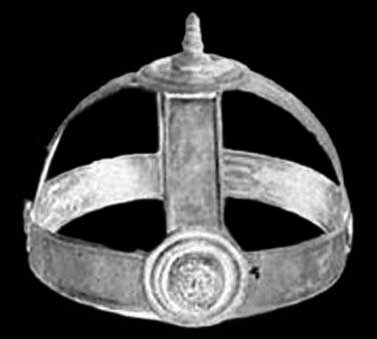THE LIST OF THE KINGS OF THE PICTS |
|||
|
As will be seen from the list, each king was identified by his own father’s name, and not by that of the preceding monarch. E.g. Talorg son of Uuid (No.44) is succeeded by Talargan son of Anfrud (45) and then by Gartnait son of Donnel (46). Normally we would expect to see Talorg son of Uuid succeeded by Talargan son of Talorg, succeeded by Gartnait son of Talargan. With very few exceptions, sons did not succeed their fathers onto the throne, and it is only towards the end of the List, when Pictish independence was drawing to a close and Pictish royalty began intermarrying with that of the Dalriadan Scots, that this rule was broken or relaxed. The reason for this rule was that the Picts, while obviously a patriarchal society, appear to have practised a system of succession known as matrilinear. Under this arrangement a son did not automatically follow his father onto the throne. Rather it was through the female royal line that the crown was inherited. Below is another Irish addition in the Thstoria Britonum' that gives us an idea of just how strongly this principle and 'golden rule' was adhered to by the Picts.
With matrilinear succession, when a Pictish king died or was deposed, he would be succeeded by either:
There were several advantages to this system:
This core belief in having the ability and freedom to pick and choose your king, and the concept of getting rid of him if he does not meet expectations, is very deeply ingrained in the Scottish psyche and is almost certainly a result of historic Pictish influence. It is best demonstrated in the Declaration of Arbroath (1320 A.D.), where it says of King Robert I (The Bruce) “ Yet if he should give up what he has begun, and agree to make us or our Kingdom subject to the King of England or the English, we should exert ourselves at once to drive him out as our enemy and a subverter of his own rights and ours, and make some other man who was well able to defend us our King; for, as long as but a hundred of us remain alive, never will we on any conditions be brought under English rule. It is in truth not for glory, nor riches, nor honours that we fight, but for freedom alone, which no honest man gives up but with life itself. ” John Mair, a teacher in Glasgow University and scholar of European repute, writing in his famous ‘Historia Majoris Britanniae’ which he completed in 1518 A.D. states, in a rather more prosaic fashion; “A king has not the same unconditional possession of his kingdom as you have of your coat………It is the free people who first give power to the King, and his power depends on the whole people. Fergus, the first King of Scots, had no other law, and so it is everywhere, and was so in general since the world began.” In other words, the people’s freedom mattered more than the fate of their king. Pictish elective procedure, through matriliny, had simply taken this principle a stage further, and who would argue that this was surely a much healthier and better method of finding a new king, or suitable heir to the throne, than the questionable patrilinear practice which is still used by Royal Families in several countries throughout the World, and embraced so wholeheartedly by their various political establishments, to this day. Under the patrilinear system, whatever the Nation or State, and whatever the political set-up, is thus accorded to the members of one particular progeny, whatever their apparent attributes or obvious lack of them, an almost god like status and seeming presumption besides, of a divine right to continue henceforth in like manner, for all of eternity without let or hindrance. Perhaps we should not allow ourselves to be surprised. In some countries of the world, where their monarchies have long been abolished for the very reasons given above, we have the supreme irony that in many of these Republics, which are often held up to be paragons of democratic virtue, the elected President can be seen to be openly engineering the political system so that his son, irrespective of his suitability for the job, can merrily follow his father’s footsteps to take his own appointed place on the ‘throne’. The general public, though quite well aware of this odious practice, often happily endorses what is happening by voting for the new ‘Prince’ and his palace officials at election time. It would seem that we humans have a weakness for allowing ourselves to be governed by blood and inheritance rather than intelligence and common sense, and it appears to be hard wired into our collective psyche. Try as we may to eradicate it, whether by bloody revolution or Act of Parliament, there it sits, waiting to spring forth at the earliest opportunity from our subconscious minds like some kind of mad Houdini out of a box. The Picts apparently knew and understood all of this very well. Therefore they rejected it out of hand and continued to do so for century upon century, generation after generation. Yet even today, for all our vaunted belief in the advantages of democracy, the opinions of the Picts on the inherent dangers of patrilinear monarchy would undoubtedly be regarded by some as seditious. Perhaps the Picts could have taught us a thing or two about the frailty of human psychology regarding the principles of democratic governance. |
REX PICTORUM |
Back to Top
Return to Paisley T. A. website
© Ron Henderson 2008-09

